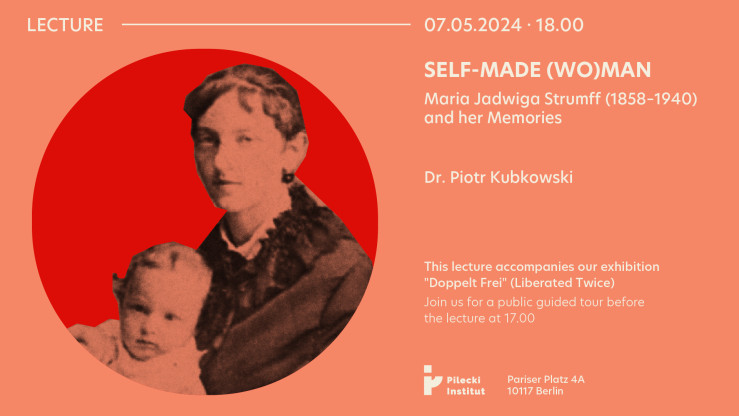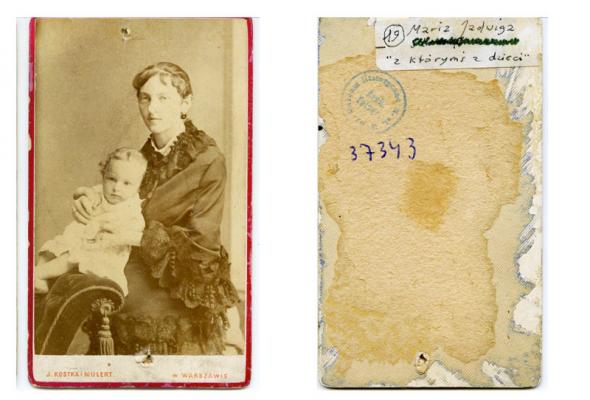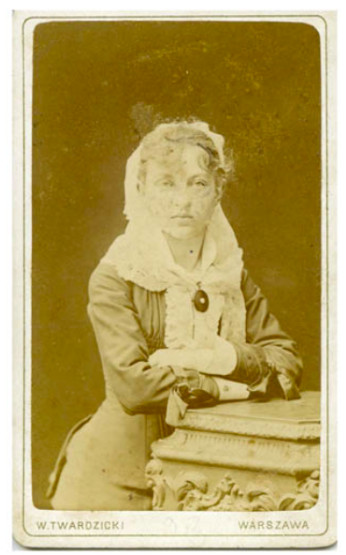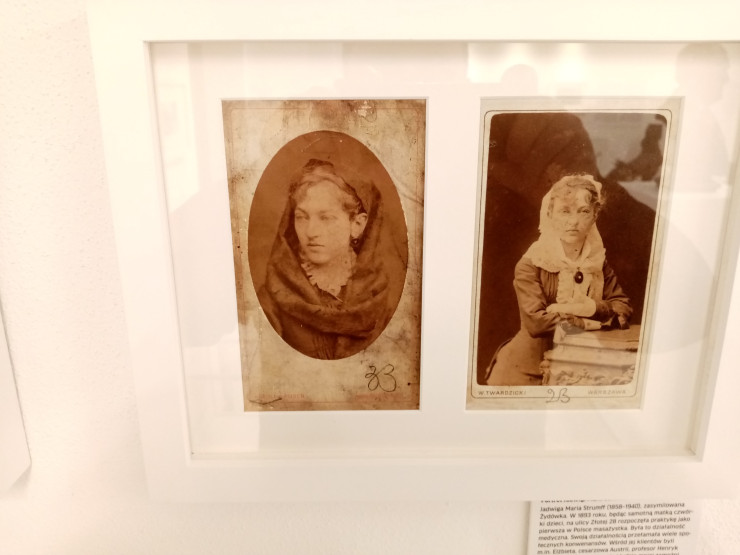"Self-made (wo)man – Maria Jadwiga Strumff (1858–1940) and her memories" - Instytut Pileckiego
07.05.2024 () 18:00
"Self-made (wo)man – Maria Jadwiga Strumff (1858–1940) and her memories"
The fourth event accompanying our exhibition "Doppelt Frei"

"Self-made (wo)man – Maria Jadwiga Strumff (1858–1940) and her memories"
Dr. Piotr Kubkowski, Department of Cultural History, Warsaw
07.05.2024 | Pariser Platz 4A, 10117 Berlin | Registration: https://forms.gle/NThXUA8dayb6pnoi7
- 17.00 (public guided tour of our exhibition "Doppelt Frei")
- 18.00 (lecture)

Dr. Piotr Kubkowski´s lecture “Self-made (wo)man - Maria Jadwiga Strumff (1858 - 1940)” is the fourth event accompanying our exhibition "Liberated Twice” (Doppelt Frei). Dr. Kubkowski will present the fascinating biography of a (very) self-confident woman in Warsaw at the end of the 19th century. Jadwiga Maria Strumff (1858-1940), a baptized Jew who had just moved to Warsaw, was left by her husband from one day to another suddenly having to raise four children by herself.

Strumff dared to take a very atypical step for women in the second half of the 19th century, namely, the step into professional life. As a so-called self-made woman, she became one of the first female masseuses in Warsaw and Poland. She articulated and shaped self-definitions of her idiosyncratic gender and sexual orientation that were clearly ahead of their time. Her memoirs are among the first testimonies of intimate relationships between women in Polish culture.

Maria Jadwiga was the lover and confidante of, among others, a famous female writer. Through her diaries, we are granted insights into the social fabric of Warsaw during a time when both men and women of influence increasingly entered the pathways to self-emancipation. The story of Maria Jadwiga Strumff eloquently illustrates these social dynamics.
Dr. Piotr Kubkowski: Cultural expert and cultural historian, specializing in the period at the turn of the 19th and 20th centuries. He deals with the cultural history of tourism and travel, sports and the body, and urban culture. He defended his doctoral thesis on the first Polish cyclists with distinction in 2017.
He is an author of different papers and monographs, e.g. The cultural history of Warsaw cyclists at the turn of the 19th and 20th centuries (2018). Co-editor and co-author of four books from the "Topo-Grafa" series (about M. Białoszewski – 2013, L. Tyrmand – 2015, M. Hłaska – 2016 and T. Konwicki – 2017) and especially publisher of Maria Jadwiga Strumff's memoirs and co-author of the volume Observations on People. Honest Confessions of a Masseuse (2021).
Kubkowski is co-curator of the exhibitions Masseuse, or intimate spaces in Warsaw at the turn of the 19th and 20th centuries (Wola Museum, 2015) and Wisła National Park (Pawilon Kamień, 2022), and co-organizer of the exhibition "Disappearing Landscapes." Miron Białoszewski's Spatial Story (Prague Museum, 2016).
Source: Muzeum Warszawy
Book – “Memoirs of Maria Jadwiga Strumff's” and “Observations on People. Honest Confessions of a Masseuse (2021)”.
In her diary, Maria Jadwiga Strumff shows herself to be an uncompromising descriptor of life in 19th century Warsaw as well as an extraordinary observer of human relations and the complexity of the rules of everyday communication. Her notes provide a valuable insight into social relations, all the more valuable because this is an account of a woman of uncertain status and questionable reputation, well-born but choosing to work for a living on her own. The plight of the working woman is one of the most important themes of "Honest Confessions" in the turn-of-the-century city. The memoirs provide a glimpse into the social functioning of women earning and supporting a family, which was still somewhat of a sensation at the time, as well as intimate confidences of the massager's clients and customers giving a picture of the desires and anxieties of people's sex lives in the 19th century.